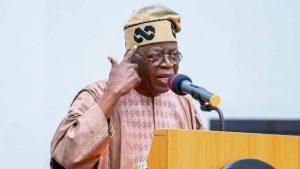The report, covering June 2023 to June 2024, is the first of its kind to use data-driven analysis to evaluate how lawmakers perform in plenary, measuring debates, motions, bills, committee reports and other legislative actions.
The Senate Leader, Opeyemi Bamidele and the Deputy Speaker of the House of Representatives, Benjamin Kalu, have emerged as the most productive lawmakers in the Senate and House of Representatives, according to a new digital accountability tool that tracked the performance of all 469 members of the National Assembly during its first year in session.
The ranking is contained in the First Session of the 10th National Assembly Deliberative Barometer and Policy Focus Productivity Report (NASS-DBPFR), unveiled in Abuja by the Erudite Growth and Advancement Foundation (ERGAF-Africa).
The report, covering June 2023 to June 2024, is the first of its kind to use data-driven analysis to evaluate how lawmakers perform in plenary, measuring debates, motions, bills, committee reports and other legislative actions.
The barometer functions like a scoreboard, breaking down legislative productivity into measurable data points. It assesses attendance, number of motions raised, contributions during debates, petitions presented, committee reports submitted, bills sponsored, and confirmation hearings participated in.

It also maps the policy focus of lawmakers to identify where their energy is being directed whether towards the economy, education, security, or health.
ERGAF-Africa President, Chibuzo Okereke, described the platform as “a digital interactive dashboard” that allows citizens, researchers, and stakeholders to track exactly what their elected representatives are doing.
Advertisement

To order your copy, send a WhatsApp message to +1 317 665 2180
According to Mr Okereke, the barometer is intended to restore quality to legislative debate, which he said had steadily declined.
“With the barometer we have put together, which we are going to demonstrate, the digital interactive dashboard of how citizens and stakeholders all over the world can navigate the dashboard and you will be able to see in this particular period, this is the lawmaker that contributed most in terms of debates on the floor and this is the number of debates that went into a particular policy proposal that were deliberated on the floor of the House of Representatives And you are able to see this is a member that has been focusing more on issues of women,” he said.
Bamidele leads the Senate pack
According to the report, Opeyemi Bamidele (Ekiti Central) ranked first in substantive contributions on the Senate floor with 92 interventions, accounting for 6.42 per cent of all recorded deliberations.
He was followed by Deputy Senate President, Barau Jibrin (Kano), who recorded 75 interventions (5.24 per cent), while Borno South Senator, Ali Ndume, and Borno North Senator, Tahir Monguno shared third position with 37 interventions each (2.58 per cent).
Among female lawmakers in the Senate, Idiat Oluranti (Lagos) topped the ranking with 22 contributions (0.96 per cent), followed by Ireti Kingibe (FCT) with 11 (0.48 per cent), and Ipalibo Banigo (Rivers) with 10 (0.43 per cent).

Kalu shines in the House
In the House of Representatives, Mr Kalu (Abia) led with 103 substantive contributions, representing 4.62 per cent of all recorded debates.
He was followed by Julius Ihonvbere (Edo) with 96 contributions (4.30 per cent) and Kingsley Chinda (Rivers) with 48 contributions (2.15 per cent).
The top-performing women in the House were Onuoha Odinaka (Imo) with 29 interventions (0.68 per cent), Late Oriyomi Onanuga (Ogun) with 21 (0.49 per cent), and Kafilat Ogbara (Lagos) with 20 (0.47 per cent).
Beyond individual rankings, the report tracked states collectively.
In the Senate, Ekiti State emerged the most productive (12.8 per cent), followed by Benue (8.0 per cent) and Kano (5.5 per cent).
In the House, Edo (7.8 per cent), Rivers (7.3 per cent), and Lagos (7.1 per cent) ranked top.
Presiding officers were also scored. Senate President Godswill Akpabio led 61 out of 81 sittings (75 per cent), while Deputy Senate President Barau Jibrin presided over seven sittings.
In the House, Speaker Abbas Tajudeen presided over 35 sittings, while Deputy Speaker Kalu presided over 26.
The Senate comprises 109 members while the House has 360 members.
Speaker welcomes barometer
Speaker Tajudeen, who was represented at the event by a member, Hart Godwin (Rivers), described the barometer as a groundbreaking tool that aligns with the House’s legislative agenda.
“This platform tracks the productivity of lawmakers and evaluates policy. It compels us to constantly raise the standard of representation, lawmaking, and oversight by spotlighting legislative output,” he said.
He added that the initiative resonates with ongoing parliamentary reforms such as the annual National Assembly Open Week and citizen engagement forums in Abuja and across the country.
Mr Tajudeen stressed that the 10th House aims to entrench evidence-based lawmaking.
“In an age where governance must respond to data, decisions backed by facts are stronger, more credible and more impactful. The barometer will serve as a reference point for legislators and stakeholders to evaluate and strengthen parliamentary contributions to national development,” he said.
NILDS, CISLAC, Christian Aid react
The Director-General of the National Institute for Legislative and Democratic Studies (NILDS), Abubakar Sulaiman, represented by NILDS’, Director, Legal Services, Shuaibu Danwaka, said the report is timely as it provides an objective assessment of lawmakers’ work.
He explained that while the executive and judiciary had developed steadily over the years, the legislature had suffered disruptions from military rule.
Mr Sulaiman, a professor, however, urged that the data be used in proper context, noting that bills and motions often involve multiple legislators.
“I will, however, urge readers and users of the data provided by the ERGAF Africa to make use of the data within the proper context. This is because the legislature works as a system; thus, attempting to fragment their performance into individual contributions may not totally present a proper picture of how the legislature works.
“Assessment of bills presented by individual legislators or a group of legislators, for instance, may not be traced to that particular member or senator alone. For instance, such bills may have been introduced in previous assemblies but reintroduced in another legislative session. Also, executive bills are mostly presented by the majority leader of both Houses.
“Furthermore, the contribution offered by other members when a bill is being considered, a motion debated, or a matter of urgent public importance is being considered, may also not be associated with the sponsor alone,” he added.
For his part, the Executive Director of CISLAC, Auwal Musa, described the barometer as an innovative scorecard that offers Nigerians the ability to evaluate their lawmakers’ performance.
“This report reflects the need for a culture of open dialogue, active engagement, and inclusive governance,” he said.
He added that the barometer would serve as a “mirror” for legislators to recognise both achievements and gaps in their work.
Country Director of Christian Aid Nigeria, Temitope Fashola, also underscored the importance of the initiative, saying it aligned with the organisation’s vision of a just and accountable society.
He said, “It is important to emphasise that this tool is not one that legislators and policymakers should view as fault-finding but as a constructive, supportive, and enabling mechanism, one that enhances the capacity of the legislature to fulfil its constitutional mandates and deepen the social contract between elected leaders and citizens.”
Mr Fashola explained that by tracking deliberations in plenary, the barometer provides a transparent record that can improve trust between citizens and representatives, improve the quality of legislation, and encourage compromise in a polarised political environment.




















